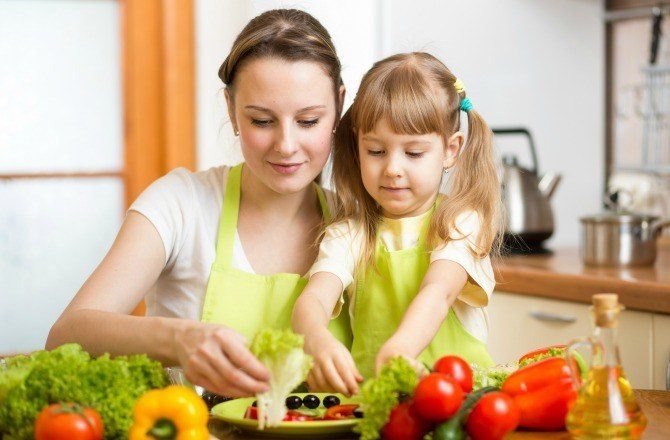Can Cooking With Kids Help Them Eat Healthier?
Getting your kids to eat more fruits and vegetables may be easier than you think; let your kids help out in the kitchen.
A study conducted by the University of Alberta and published in the journal Public Health Nutrition shows that kids who cook, eat more healthfully. In their study of fifth grade students from 151 schools across Alberta they found that children who were involved in home meal preparation chose fruits and vegetables more often than their non-cooking counterparts (vegetable preference, specifically, was 10 percent higher among kids who cooked) and that kids who cooked demonstrated more confidence in their ability to choose (and eat) healthy foods both at home and at school. The study concludes that "encouraging children to be more involved in home meal preparation could be an effective health promotion strategy."
Though more research is needed to understand the variety of factors that influence what kids eat and how to instill livelong healthy eating habits, just about any parent who cooks with their kids will tell you that a there is a clear connection between cooking and healthy eating; kids who help prepare healthy foods are more willing to give them a try.
If your child is choosy about fruits and vegetables, here are a few things you can try:
• Hand your child a piece of produce and let them ask questions about it. Even if they're not ready to try a fruit or vegetable right away, holding it in their hands and talking about it will increase their familiarity with the ingredient.
• Teach your child to make simple, no cook, no-knife recipes (click here to see some of our favorites). The University of Alberta's study concluded that teaching children how to prepare simple and healthy meals could be an effective strategy for improving their dietary habits.
• If your child is old enough to follow instructions well, let them cut fruits and vegetables for dinner. Give them a child-safe knife and show them how to cut the produce (guiding their hands until they demonstrate the ability to continue on their own). Younger children will need guidance throughout the entire process. Regardless of your child's age and abilities, be sure to provide constant supervision.
• If your child likes to stir ingredients in a bowl, toss cubed vegetables into a large bowl with olive oil, salt, and seasonings and let your child mix until the vegetables are lightly coated. Then help your child dump the vegetables onto a heavy baking sheet. You can roast the vegetables in a 425 to 450 degree oven and serve them with dinner.
• Younger children who are not ready to handle a knife can do things like peeling carrots, crushing tomatoes with their hands for a fresh tomato sauce, or using a spoon to scoop out seeds from melons, squash, and other seasonal produce.
Kristie Collado is The Daily Meal's Cook Editor. Follow her on Twitter @KColladoCook.
